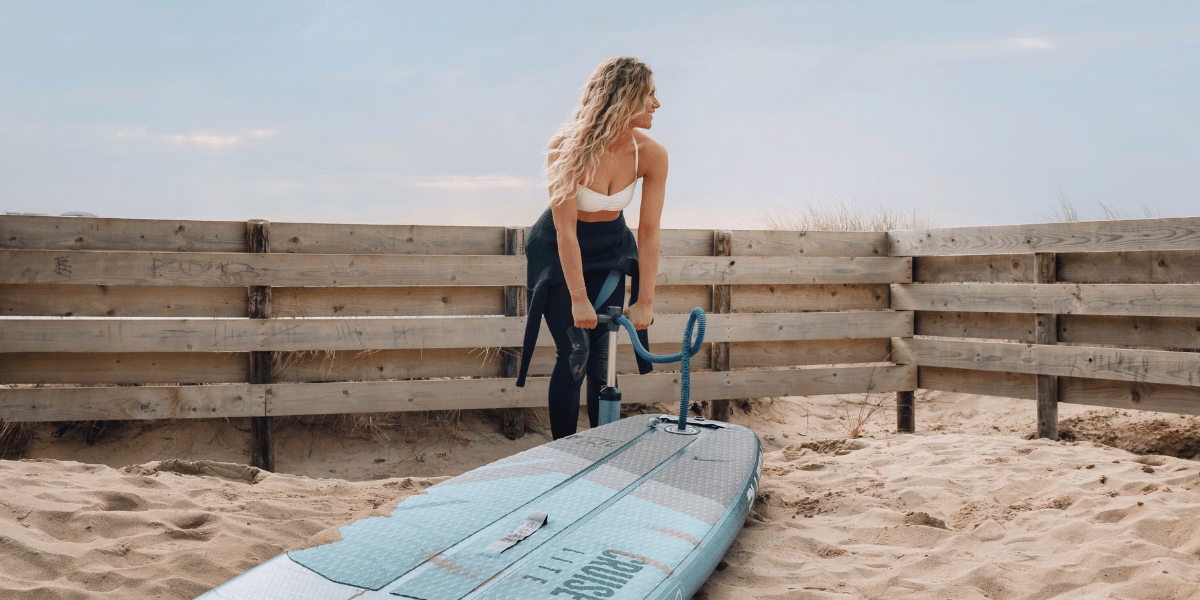It might look funny to surfers but SUP surfing is in a category all of its own. It’s an accessible way to ride waves which means more people than ever before will find their spot in the line up. Even if you’ve never surfed on a traditional board, you can still SUP surf. Clearly it is the use of a paddle that sets this sport apart. The paddle is also what gives the rider a few nice little advantages over arms alone.

SUP Surfing vs Surfing
Think of your paddle as the power of your arms squared. This is where the differences between SUP surfing and traditional surfing really begin. We wouldn’t say it’s easier, but a paddle definitely has the potential to help move you along. So how does a paddle help?
Pros of Surfing with a Paddle
- Catch waves faster because it’s easier to get your speed up.
- Ride longer and balance easier because you can use your paddle to steady yourself and steer.
- Surf bigger waves due to both of the above.
- See waves coming earlier while standing than while sitting and position yourself earlier to catch them.
- Stay warmer above the water while you wait if you do so standing. If you want to straddle the board that’s fine too.
- Paddle between sets if you don’t want to stay still.
- No waves? No problem! You can still spend the day on the water stand up paddling. If it’s good enough for Laird Hamilton, it’s good enough for us.
Traditional Surfing
- Can be far more physically demanding.
- Arms need to be super strong to paddle fast enough to catch waves.
- More time spent partially submerged while waiting between sets can make you chilly.
- Balance depends totally on your core and legs, no steadying yourself with a paddle.
- You can only surf with a surfboard, you need another hobby for flat calm days.
What’s the same?
- Surf etiquette applies. Not only will this help you avoid conflict, it will keep you and anyone else around you safe.
- Where you surf still depends on your ability level and avoiding potential hindrance to other people.
- You still need to be aware of swimmers and body boarders.
- The same risks are present and proficiency with swimming is essential.
- All ocean sports entail risk, you should never go out on days that you can’t handle or attempt conditions that would be dangerous for you.
SUP Surfing on waves big & small
The waves you SUP surf are limited by your ability level, your gear and the conditions on the water. Although you may not have seen it, big wave SUP surfing really is a thing and it’s not to be scoffed at. Pro SUP surfers are all over Jaws and have been for years, just check out Kai Lenny.
It’s clear that SUP surfing monster waves is possible, and a different sport than traditional big wave surfing. What most of us will be doing on a SUP surf day is a different story. If you don’t have access to or the salt for mega huge waves, there is still fun to be had on ankle biting days. SUP surfing on small waves is attainable for most people, you don’t need to travel to Hawaii, have a death wish or a Billabong sponsorship. In fact, you don’t even need a SUP surfing specific board. An all around board will work fine and if it’s inflatable, even better.
How do I learn to SUP Surf?
The first step to SUP surfing is getting a handle on stand up paddling. If you don’t live near the beach, you can do this on pretty well any calm body of water. Build up your balance and core strength by spending time on your board. There is no magic trick, just put in the time.
Take lessons if you aren’t the type to try and fail publicly. Learning to surf or even just SUP takes time and a good instructor will help you build a foundation quickly. If you’re down in Cornwall, Harlyn Surf School is a gorgeous spot.
Trial and error and self learning are totally legit. Just be sure to choose conditions that are safe for you to deal with unsupervised. We recommend calm days with small break on areas of the beach without loads of swimmers, but within range of a life guard. Also, be sure that you are not getting in the way of more advanced surfers.
A Big Bluefin Thank you
The Surfing Handbook is a super resource for anyone who wants to know how to surf safely and avoid conflict. Check it out!

Share:
How To Store Your Paddle Board In Winter
Swap the Gym for your SUP!